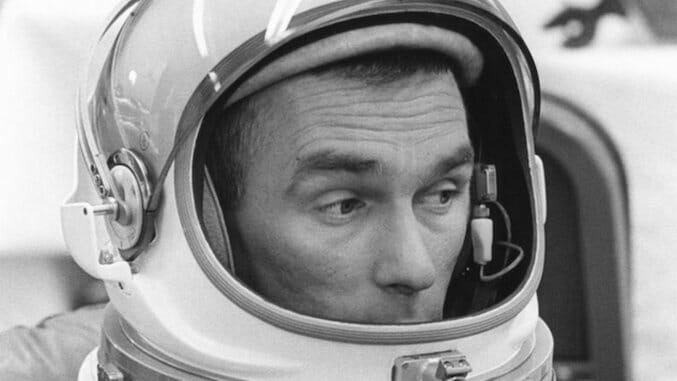
There’s an interesting story to be told about Eugene Cernan, one of the astronauts on Apollo 17, NASA’s last Apollo mission before the space program was shut down. It’s not necessarily to be found in The Last Man on the Moon, Mark Craig’s documentary portrait of the man. Many of the biographical details Cernan and others offer of life as an astronaut—the rigorous training process, the close-knit community fellow astronauts and their families, the anxieties of space travel they all experienced in different ways—will be less than revelatory to anyone who has either read Tom Wolfe’s 1979 book The Right Stuff or seen Philip Kaufman’s 1983 film adaptation (without the playfully ironic tone both artists brought to their respective works). But outside of being chosen by NASA to participate in their Gemini and Apollo space programs, and eventually getting a chance to walk on the moon himself, Cernan’s personal life frankly seems pretty unremarkable—its most dramatic event being his divorce from first wife Barbara and eventual remarriage to Jan Nanna.
Perhaps Craig is aware of the near-squeaky-clean nature of his central figure; this might explain some of the filmmaking. Lorne Balfe’s score, for instance, ranges from choral settings and meditative Brian Eno-like ambient sound fields to more bombastic Hans Zimmer-like cues. The film also features clever patterns that imply Cernan’s introspective side: At a few points, editors David Fairhead and Dan Haythorn intercut archival footage with shots of Cernan walking around by himself or sitting on a couch and staring up at the ceiling, the juxtaposition suggesting a sense of mental recall on Cernan’s part without him saying a word. Craig even gets away with one cutesy bit of Catch Me If You Can-style animation, connecting it to an impression Cernan articulates during the sequence of his initial encounter with and eventual training regimen at NASA as being akin to a spy movie.
There’s more to these bits of formal play, however, than Craig’s way of artificially jazzing up one man’s life story. Note the touchingly humbled way Cernan talks about his experiences out in space onboard Apollos 10 and 17—as if those adventures represented the closest this otherwise average all-American Joe came to seeing God. Beyond Cernan’s obvious nostalgia for a bygone era of space travel—an era he talks about relentlessly to this day, even as some of his friends wonder aloud whether his inexhaustible efforts are worth it—a subtler and more spiritually resonant theme emerges: that of an utterly ordinary American who got a glimpse of the extraordinary. Perhaps the copious biographical details, as banal as they may be, are ultimately necessary to emphasize just how lucky Cernan was to travel to the farther reaches of our universe. When The Last Man on the Moon ends with Cernan voicing his own takeaway from his experiences—“I walked on the moon. What can’t you do?”—the moment for once feels less like an inspirational platitude than one of hard-won wisdom.
Director: Mark Craig
Writer: Mark Craig
Starring: Eugene Cernan, Alan Bean, Charles Duke, Gene Kranz, Jim Lovell, Barbara Cernan Butler
Release Date: February 26, 2016
Kenji Fujishima is a freelance film critic, contributing to Slant Magazine, Brooklyn Magazine, The Playlist, and the Village Voice in addition to Paste. He is also Deputy Editor of Movie Mezzanine and former editor-in-chief of In Review Online. When he’s not watching movies and writing and editing film criticism, he’s trying to absorb as much music, art and literature as possible. He has not infrequently been called a “culture vulture” for that reason.